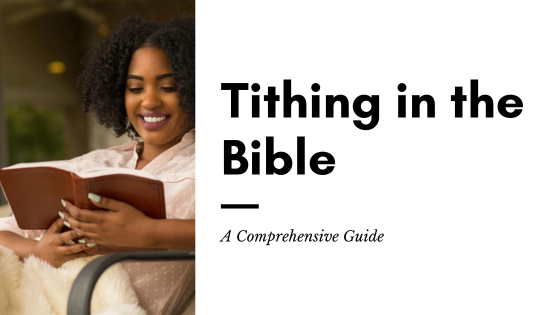
What Is Tithing in the Bible?
Tithing in the Bible refers to ancient Israelites giving ten percent of their agricultural produce and cattle to the tribe of Levi, who did not receive a land inheritance. The tithes supported the Levites and their work in the Temple.
“And, behold, I have given the children of Levi all the tenth in Israel for an inheritance, for their service which they serve, even the service of the tabernacle of the congregation.”
Numbers 18:21, KJV
Tithing in Christianity refers to giving a specific portion, traditionally one-tenth (10%), of one’s income or resources to support the church’s work and aid those in need. This concept is deeply rooted in the Old Testament of the Bible.
Table of Contents
- Summary and Key Takeaways
- God’s Word and Tithing: A Deeper Understanding
- Tithing in the Old Testament: Unveiling the Origins of an Ancient Practice
- Tithes in Leviticus: God’s Portion
- Tithes in the Book of Numbers: Supporting the Levites
- Tithes in Deuteronomy: Expressing Reverence and Social Responsibility
- The Book of Malachi: A Message of Rebuke About Tithing
- Old Testament Scriptures on Tithing
- Tithing in the New Testament: Exploring Giving Principles
- Tracing the Roots: A Brief History of Tithing in Scripture
- Discover More Truth About Tithing!
Summary and Key Takeaways

Tithing in the Bible involves giving a specific portion of agricultural produce and cattle to support the Levites in ancient Israel. In Christianity, it refers to giving a portion of one’s income or resources to support the church and help those in need. Tithing is rooted in the Old Testament and is mentioned in various biblical stories and laws. While the New Testament doesn’t prescribe a specific tithe, it emphasizes the principles of generosity and cheerful giving.
Key Takeaways
- Tithing originated in ancient Israel as giving ten percent of agricultural produce and cattle to support the Levites.
- Tithing in Christianity involves giving a portion of income or resources to support the church and aid those in need.
- Tithing is rooted in the Old Testament and is mentioned in various biblical stories, such as Abraham’s tithe to Melchizedek and Jacob’s vow to give a tenth to God.
- The Books of Leviticus and Numbers outline the importance of tithing in supporting the priests and Levites who served in the religious functions of Israel.
- In the New Testament, Jesus acknowledges tithing as part of the Mosaic Law but emphasizes the weightier matters of love, compassion, and integrity.
- The Apostle Paul teaches voluntary, generous giving from the heart rather than a rigid tithe system.
- While tithing is not commanded in the New Testament, the principles of generosity and supporting the church and those in need are emphasized.
Click the blog posts below to explore more in-depth biblical insights on tithing:
God’s Word and Tithing: A Deeper Understanding

In this resource, “Tithing in the Bible: A Comprehensive Guide”, we’ll dive into the heart of the matter, exploring the biblical concept of tithing in simple, straightforward terms. We’ll uncover its origins, purposes, and relevance for modern-day Christians, all backed by the wisdom of God’s Word.
Tithing is a term that often surfaces in discussions among Christians, but what does it mean in the context of the Bible? If you’ve ever wondered, “What is tithing?” you’re not alone. Tithing is a practice deeply rooted in the Scriptures, and it holds a significant place in the lives of many believers. So, let’s embark on this enlightening journey together, seeking a better understanding of what tithing truly means.
Tithing in the Old Testament: Unveiling the Origins of an Ancient Practice

Tithing in the Old Testament stands out as a significant thread woven through the lives of God’s people. You might have heard about it, wondered about it, or even questioned its relevance today. In this exploration of “Tithing in the Old Testament,” we’ll journey back in time to uncover the roots of this ancient practice. Together, we’ll delve into the Scriptures, where stories and laws reveal what tithing meant in the Old Testament.
Tithing in Genesis: Abraham’s Tithe to Melchizedek
In the book of Genesis, we find the roots of tithing in the story of Abram (later known as Abraham) as he encountered Melchizedek, the priest-king of Salem. This fascinating encounter is a pivotal moment in understanding the concept of tithing in the Bible.
Abram’s nephew Lot had been captured during a battle among several kings. When Abram heard this, he gathered 318 trained servants and pursued the captors. With God’s help, Abram defeated the enemy kings and rescued Lot and other captives. Upon returning from this victorious battle, Abram encountered Melchizedek, a priest of God and a king of Salem (later understood to be Jerusalem).
Genesis 14:18-20 (KJV) states:
“18 And Melchizedek king of Salem brought forth bread and wine: and he was the priest of the most high God. 19 And he blessed him, and said, Blessed be Abram of the most high God, possessor of heaven and earth: 20 And blessed be the most high God, which hath delivered thine enemies into thy hand. And he gave him tithes of all.”
Abram voluntarily gives a tenth (a tithe) of all the spoils of war to Melchizedek. Abram’s tithe acknowledged God’s provision and honored Him through giving. This tithe was not as structured as in later biblical texts.
Explore the Roots of Tithing Before Moses. Curious about tithing’s origins before the Mosaic Law? Click the blog post links below to explore the rich history and profound significance of pre-law tithing.
- Abraham and Melchizedek – The Truth About the First Biblical Tithe
- Is the Pre-Law Tithe God’s Eternal Law?
Jacob’s Tithe: Tithing in Response to God’s Blessings
The story of Jacob making a vow to give God a tenth (tithe) if God blesses him is found in Genesis 28:20-22. Jacob, the son of Isaac and grandson of Abraham, was on a journey when he encountered God. He had left his home and was traveling to his uncle Laban’s house. Along the way, he stopped for the night and used a stone for a pillow (Genesis 28:11-12).
During his sleep, Jacob had a dream in which he saw a ladder reaching from earth to heaven, with angels ascending and descending on it. At the top of the ladder, he saw the Lord standing, who reaffirmed the covenant promises made to Abraham and Isaac. God promised Jacob the land, descendants, and His presence and protection. (Genesis 28:13-17)
After waking up from the dream and realizing the significance of the encounter, Jacob made a vow to God. Genesis 28:20-22 (KJV) states:
“20 And Jacob vowed a vow, saying, If God will be with me, and will keep me in this way that I go, and will give me bread to eat, and raiment to put on, 21 So that I come again to my father’s house in peace; then shall the Lord be my God: 22 And this stone, which I have set for a pillar, shall be God’s house: and of all that thou shalt give me I will surely give the tenth unto thee.”
Jacob vowed to respond to God’s promise and express his commitment to follow God. He promised to give God a tenth of all that God would bless him with, including material wealth.
Tithes in Leviticus: God’s Portion

In the Book of Leviticus, tithes are primarily discussed in the context of supporting the priests and the Levites, who served in the Tabernacle (later the Temple). The tribe of Levi had no inheritance of land. As a result, the tithes provided for their material needs and sustained the religious functions of the Israelite community. Here’s a summary of the role of tithes in the Book of Leviticus, along with relevant verses:
- Levitical Tithes: Leviticus 27:30-33 states that a tenth (10%) of everything from the land (i.e., crops, fruits, or livestock) belongs to the Lord and is considered holy. This portion was to be set apart and given to support the work of the priests and Levites.
- Redeem Tithes for Festivals and Offerings: Leviticus 27:31 mentions that if someone wished to redeem a part of their tithes, they could add a fifth of its value. This provision allowed individuals to redeem tithes for personal use but with a penalty.
The Book of Leviticus emphasizes the importance of tithing as a means of providing for the Levites and priests who served in the religious functions of Israel. It establishes that a tenth of all produce and livestock belongs to the Lord and is dedicated to sustaining the religious community.
Uncover the Divine Connection Between Tithes and the Levites! Read the articles below to discover how tithing supported the Levites and impacted God’s work.
Tithes in the Book of Numbers: Supporting the Levites

In the Book of Numbers, tithes are primarily discussed in the context of supporting the Levites and the priests in their service at the Tabernacle and in the context of offerings for religious festivals. Here’s a summary of the role of tithes in the Book of Numbers (Numbers 18:21-24).
Tithes for the Levites
The Levites, who had no inheritance among the tribes of Israel, were given the tithes as their inheritance. Numbers 18:21 (KJV) states:
“And, behold, I have given the children of Levi all the tenth in Israel for an inheritance, for their service which they serve, even the service of the tabernacle of the congregation.”
This tithe was compensation for their service in the Tabernacle, where they assisted the priests in various roles. This support enabled them to focus on their duties in the service of the Tabernacle.
The Levites Commanded to Tithe
Numbers 18:25-32 also outlines how the Levites were to give a tithe of the tithes they received as an offering to the Lord. Numbers 18:26 (KJV):
“Thus speak unto the Levites, and say unto them, When ye take of the children of Israel the tithes which I have given you from them for your inheritance, then ye shall offer up an heave offering of it for the Lord, even a tenth part of the tithe.”
This additional tithe was given for the maintenance of the Tabernacle and to support the various religious festivals and offerings that took place.
The Book of Numbers reinforces the role of tithes in providing for the Levites and priests who conducted the religious affairs of Israel. It also introduces the concept of the Levites offering a portion of the tithes they received to maintain the Tabernacle and celebrate Hebrew festivals. Click the blog post below to explore more ways tithing was practiced in ancient Israel.
Tithes in Deuteronomy: Expressing Reverence and Social Responsibility

In the book of Deuteronomy, we find detailed instructions regarding tithing, emphasizing the importance of faithful giving to honor God. Deuteronomy 14:22-23 (KJV) states:
“22 Thou shalt truly tithe all the increase of thy seed, that the field bringeth forth year by year. 23 And thou shalt eat before the Lord thy God, in the place which he shall choose to place his name there, the tithe of thy corn, of thy wine, and of thine oil, and the firstlings of thy herds and of thy flocks; that thou mayest learn to fear the Lord thy God always.”
These verses reveal that tithing in Deuteronomy involved giving a tenth of one’s produce and livestock annually. It wasn’t merely an obligation but an opportunity to express reverence for God and cultivate a heart of gratitude. Deuteronomy 26:12 further clarifies that this tithe would be shared with those in need, underscoring the social responsibility aspect of tithing.
Empower Your Faith! Click the blog post below to explore the transformative practice of giving tithes to the less fortunate.
Can I Give My Tithe to the Poor?
The Book of Malachi: A Message of Rebuke About Tithing

In the Book of Malachi, tithing is a prominent theme, and it is associated with a message of rebuke and correction from the Lord to the people of Israel. The book also mentions the “storehouse,” which plays a significant role in the rebuke directed at the priests. Here’s a summary of the role of tithes in the Book of Malachi:
Tithes and the Storehouse
Malachi 3:8-10 addresses the Israelites’ failure to bring their tithes and offerings to the Lord’s storehouse:
“Will a man rob God? Yet ye have robbed me. But ye say, Wherein have we robbed thee? In tithes and offerings. Ye are cursed with a curse: for ye have robbed me, even this whole nation. Bring ye all the tithes into the storehouse, that there may be meat in mine house, and prove me now herewith, saith the LORD of hosts, if I will not open you the windows of heaven, and pour you out a blessing, that there shall not be room enough to receive it.”
In these verses, the Lord accuses the Israelites of robbing Him by withholding their tithes and offerings. The “storehouse” refers to a room in the Temple where the tithes and offerings would be brought. Tithes were stored there for the priests’ support and the Temple’s maintenance. The people’s failure to bring their tithes had led to a spiritual and material deficiency in the house of the Lord.
Malachi Rebukes the Priests
Prophet Malachi also rebukes the priests for their negligence and corrupt practices in their service to God. The priests were entrusted with collecting and managing the tithes and offerings.
- Malachi 1:6 (KJV): “A son honoureth his father, and a servant his master: if then I be a father, where is mine honour? and if I be a master, where is my fear? saith the LORD of hosts unto you, O priests, that despise my name. And ye say, Wherein have we despised thy name?”
- Malachi 2:1-2 (KJV): “And now, O ye priests, this commandment is for you. If ye will not hear, and if ye will not lay it to heart, to give glory unto my name, saith the LORD of hosts, I will even send a curse upon you, and I will curse your blessings: yea, I have cursed them already because ye do not lay it to heart.”
Malachi rebukes the priests for dishonoring God by neglecting their duties and accepting blemished and impure offerings. Their failure to uphold the proper administration of tithes and offerings led to spiritual decay and the withholding of God’s blessings.
In summary, the Book of Malachi highlights the importance of bringing tithes and offerings to the Lord’s storehouse to support the work of the Temple and the priesthood. The failure to do so results in a rebuke from the Lord. In this context, the prophet Malachi rebukes the people and the priests for their negligence of tithing and offerings.
Dive Deeper into Tithes and Offerings! Click the links below to explore insightful articles that unravel the profound teachings about tithes and offerings and how they impact your faith.
Old Testament Scriptures on Tithing
| Verses | Scriptures |
| Leviticus 27:30 | “And all the tithe of the land, whether of the seed of the land or of the fruit of the tree, is the Lord’s. It is holy to the Lord.” |
| Leviticus 27:32 | “And concerning the tithe of the herd or of the flock, even of whatsoever passeth under the rod, the tenth shall be holy unto the Lord.” |
| Numbers 18:21 | “And, behold, I have given the children of Levi all the tenth in Israel for an inheritance, for their service which they serve, even the service of the tabernacle of the congregation.” |
| Numbers 18:24 | “But the tithes of the children of Israel, which they offer as an heave offering unto the Lord, I have given to the Levites to inherit: therefore I have said unto them, Among the children of Israel they shall have no inheritance.” |
| Numbers 18:26 | “Thus speak unto the Levites, and say unto them, When ye take of the children of Israel the tithes which I have given you from them for your inheritance, then ye shall offer up an heave offering of it for the Lord, even a tenth part of the tithe.” |
| Deuteronomy 14:22 | “Thou shalt truly tithe all the increase of thy seed, that the field bringeth forth year by year.” |
| Deuteronomy 14:23 | “And thou shalt eat before the Lord thy God, in the place which he shall choose to place his name there, the tithe of thy corn, of thy wine, and of thine oil, and the firstlings of thy herds and of thy flocks; that thou mayest learn to fear the Lord thy God always.” |
| Deuteronomy 14:28 | “At the end of three years thou shalt bring forth all the tithe of thine increase the same year, and shalt lay it up within thy gates.” |
| 2 Chronicles 31:5 | “And as soon as the commandment came abroad, the children of Israel brought in abundance the firstfruits of corn, wine, and oil, and honey, and of all the increase of the field; and the tithe of all things brought they in abundantly.” |
Tithing in the New Testament: Exploring Giving Principles

As we navigate the pages of the New Testament, we encounter a shift in the landscape of tithing. While the Old Testament provided clear guidelines on tithing, the New Testament doesn’t state a specific command to tithe. In the New Covenant, the importance of being generous, giving joyfully, and supporting the church and those in need remains a focus.
Let’s explore the New Testament’s teachings on tithing, the importance of giving, and the heart of generosity.
Jesus and Tithing: Transitioning from the Old to the New Testament
In the Gospels, Jesus does address the topic of tithes. It’s important to note that during Jesus’ earthly ministry, he and His fellow Hebrews still lived under the Mosaic Law. The New Testament had not yet been established. Here’s a summary of Jesus addressing the role of tithes:
Jesus’ Teaching on Tithing
In the Gospels of Matthew and Luke, Jesus mentions the practice of tithing while addressing the Pharisees and Scribes. The Pharisees were known for their strict adherence to Hebrew religious traditions and laws. Additionally, they were considered experts in interpreting and applying the Torah (the Mosaic law).
The Scribes were scholars and experts in the Mosaic law (the Torah) and were responsible for copying and preserving sacred texts, including the Torah scrolls. Scribes also had a role in interpreting and teaching the law to the people.
In the following verses, Jesus delivers a strong rebuke while acknowledging that tithing is a part of the Mosaic Law:
- Matthew 23:23 (KJV): “Woe unto you, scribes and Pharisees, hypocrites! for ye pay tithe of mint and anise and cummin, and have omitted the weightier matters of the law, judgment, mercy, and faith: these ought ye to have done, and not to leave the other undone.”
- Luke 11:42 (KJV): “But woe unto you, Pharisees! for ye tithe mint and rue and all manner of herbs, and pass over judgment and the love of God: these ought ye to have done, and not to leave the other undone.”
In these passages, Jesus criticizes the Pharisees for tithing while neglecting the more significant matters of the law. This suggests that while tithing has its place under the Mosaic Law, it should not be at the expense of love, compassion, and integrity.
Jesus’ ministry occurred within the context of the Old Covenant. He introduced the concept of the New Covenant in Luke 22:20. However, tithing remained a recognized practice among His followers (and other Hebrews) until the New Covenant was fully established in the early Christian Church (Acts 2:38-39).
Uncover the Truth About Jesus and Tithing in the Scriptures! Click the links below to explore articles that shed light on Jesus’ teachings about tithing, generosity, and stewardship in the Bible.
How Did Jesus Support His Ministry?
Misquoting Jesus for That Mighty Dollar
Paul on Tithing: A Heartfelt Approach
When we examine the writings of the Apostle Paul in the New Testament, we find valuable insights into his perspective on giving and financial support within the Christian community. Unlike the Old Testament, Paul doesn’t endorse a rigid tithe system for believers. Instead, his teachings emphasize a more generous and voluntary approach.
In 2 Corinthians 9:7 (KJV), Paul writes:
“Every man according as he purposeth in his heart, so let him give; not grudgingly, or of necessity: for God loveth a cheerful giver.”
This verse underscores the importance of cheerful, purposeful giving that springs from a willing heart rather than obligation.
Paul also encourages believers to give according to their means (2 Corinthians 8:13). This flexible approach reflects the New Testament emphasis on love, grace, and generosity rather than strict adherence to a specific percentage.
Overall, Paul’s teachings on tithing in the New Testament emphasize joyful and voluntary giving that reflects the believer’s heart and financial capacity, mirroring the grace and love of Christ.
Discover the Freedom of Voluntary Giving! Click here to explore thought-provoking articles exploring how voluntary giving aligns with the New Testament’s spirit of love and generosity. These resources offer a fresh perspective on your stewardship journey.
- Was Tithing Just for Israel?
- Is the Tithe for the New Testament Believers?
- When Did Tithes End?
- Why the Bible Doesn’t Say Tithing Ended?
Tracing the Roots: A Brief History of Tithing in Scripture
As we’ve journeyed through the pages of Scripture, we’ve discovered a brief history of tithing, from Abraham’s voluntary tithe to the Levitical system and the teachings of Jesus. In the Old Testament, the ancient practice was integral to God’s covenant with the Hebrew Israelites. The tribes were legally obligated to support the Levites who were responsible for maintaining the Tabernacle (later Temple) and conducting religious services.
Under the fullness of the New Testament, there is no strict percentage amount of money Christians are required to give to a church or ministry. For instance, the Apostle Paul promotes voluntary giving from the heart based on what you can afford. This way, your giving becomes a source of joy, growth, and faithful stewardship.
Discover More Truth About Tithing!

Unveil the Secrets of Faith and Finances with our Amazon Best-Selling Book!
Are you a Christian seeking clarity on the age-old practice of tithing? Dive into our eye-opening book, The Tithing Hoax, and:
- Uncover the Real History: Explore the origins of tithing and how it’s evolved over centuries.
- Challenge Common Beliefs: Gain a fresh perspective on what the Bible says about giving.
- Reclaim Financial Freedom: Learn how to manage your finances in alignment with your faith.
Don’t miss out on this life-changing revelation! Join countless Christians worldwide who have transformed their understanding of tithing.
Grab your copy today and embark on a journey to faith-based financial wisdom. Your financial future is waiting!
👇 Click below to order now and experience the truth for yourself. 👇
🙏 Take the first step towards financial and spiritual well-being!